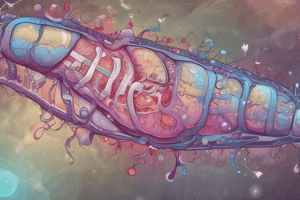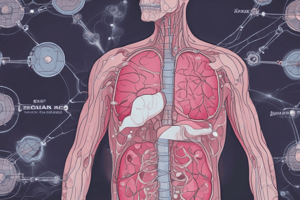Podcast
Questions and Answers
What is the primary function of sebaceous glands?
What is the primary function of sebaceous glands?
- Create hormones to regulate metabolism
- Release sweat to regulate body temperature
- Secrete digestive enzymes into the small intestine
- Produce oil to lubricate and protect the skin (correct)
Which gland is responsible for producing hormones that regulate the endocrine system?
Which gland is responsible for producing hormones that regulate the endocrine system?
- Adrenal glands
- Pituitary gland
- Pancreas
- Hypothalamus (correct)
What hormone-related function do ovaries perform?
What hormone-related function do ovaries perform?
- Produce estrogen and progesterone (correct)
- Secrete mucus to protect the intestines
- Control heart rate and blood pressure
- Regulate blood sugar levels
What role does the pancreas play in digestion?
What role does the pancreas play in digestion?
What is the function of Brunner glands in the digestive system?
What is the function of Brunner glands in the digestive system?
What is the primary role of cholesterol in the body?
What is the primary role of cholesterol in the body?
Which mechanism of hormone release is triggered by changes in blood ion levels?
Which mechanism of hormone release is triggered by changes in blood ion levels?
Which hormone is an example of neural stimulation?
Which hormone is an example of neural stimulation?
What is the primary function of the neuroendocrine system?
What is the primary function of the neuroendocrine system?
What triggers hormonal secretion in the neuroendocrine system?
What triggers hormonal secretion in the neuroendocrine system?
What is the primary role of the hypothalamus in the endocrine system?
What is the primary role of the hypothalamus in the endocrine system?
Which of the following is a function of the hypothalamus?
Which of the following is a function of the hypothalamus?
Through which system does the hypothalamus connect to the anterior pituitary?
Through which system does the hypothalamus connect to the anterior pituitary?
What do hypophysiotropic hormones do?
What do hypophysiotropic hormones do?
Which hormones are classified as neurohormones produced by the hypothalamus?
Which hormones are classified as neurohormones produced by the hypothalamus?
What is the primary function of endocrine glands?
What is the primary function of endocrine glands?
Which of the following correctly describes exocrine glands?
Which of the following correctly describes exocrine glands?
Which hormone is secreted by the beta cells of the pancreas?
Which hormone is secreted by the beta cells of the pancreas?
What is the role of the pituitary gland in the endocrine system?
What is the role of the pituitary gland in the endocrine system?
Which of the following is NOT a function of exocrine glands?
Which of the following is NOT a function of exocrine glands?
Which substance is secreted by the pancreas in its exocrine function?
Which substance is secreted by the pancreas in its exocrine function?
What distinguishes endocrine glands from exocrine glands?
What distinguishes endocrine glands from exocrine glands?
Which type of gland releases sebum and sweat?
Which type of gland releases sebum and sweat?
Which hormone is primarily responsible for stimulating the release of ACTH?
Which hormone is primarily responsible for stimulating the release of ACTH?
Which hormone inhibits the secretion of Prolactin?
Which hormone inhibits the secretion of Prolactin?
What is the role of Gonadotropin-Releasing Hormone (GnRH)?
What is the role of Gonadotropin-Releasing Hormone (GnRH)?
Which hormone inhibits the secretion of Somatotropic Hormone (STH)?
Which hormone inhibits the secretion of Somatotropic Hormone (STH)?
Which of the following hormones is NOT a hypothalamic releasing hormone?
Which of the following hormones is NOT a hypothalamic releasing hormone?
Flashcards are hidden until you start studying
Study Notes
Endocrinology
- The study of hormone secretion, hormone action, and feedback control
- Involves the endocrine system which secretes hormones directly into the bloodstream
- Endocrine system is evaluated by measuring hormone concentrations
- Exocrine glands secrete other substances through a duct
Pancreas
- Has both exocrine and endocrine functions
- Exocrine enzymes include proteases, lipases, and amylase
- Endocrine hormones include insulin (beta cells) and glucagon (alpha cells)
- Islets of Langerhans are regions of the pancreas containing endocrine cells
Hormones
- Derived from the Greek term “to set in motion”
- Dynamic in nature and elicit cellular responses by regulating physiological processes through feedback mechanisms
- Cholesterol is a precursor for many steroid hormones like estrogen, testosterone, and progesterone.
Mechanisms of Hormone Release
- Humoral: In response to changing levels of ions or nutrients in the blood (e.g. insulin)
- Neural: Stimulation by nerves (e.g. oxytocin, ADH - hypothalamus)
- Hormonal: Stimulation received from other hormones (e.g. hypothalamic-pituitary axis)
Neuroendocrine system & Neurohormones
- Mechanism by which the hypothalamus maintains homeostasis by regulating reproduction, metabolism, eating behavior, drinking behavior, energy utilization, osmolarity and blood pressure.
- Hypothalamus regulates pituitary functions
- Hypothalamus secretes releasing hormones and inhibiting hormones into the anterior pituitary gland
- Secretory activity of endocrine glands (pituitary, thyroid, adrenal and gonads) is controlled by the nervous system
- Neurohormones are produced by specialized neurosecretory cells of the nervous system (e.g. oxytocin and vasopressin - neurohypophysial hormones)
Neurotransmitters vs Neurohormones
- Neurotransmitters act locally, within synapses, and often have a rapid, short-lived effect.
- Neurohormones are secreted into the bloodstream and have a more widespread and lasting effect.
Master Regulator - Pituitary gland
- Anterior pituitary - responsible for the synthesis and secretion of many hormones
- Posterior pituitary - stores and releases hormones produced by the hypothalamus
Hypothalamic-pituitary axis
- HPT (Hypothalamic-Pituitary-Thyroid) axis
- HPG (Hypothalamic-Pituitary-Gonad) axis
- HPA (Hypothalamic-Pituitary-Adrenal) axis
Hypothalamus role
- Controls many fundamental physiological activities like body temperature, hunger, thirst, sleep and some ANS functions
- The interface between the endocrine and the nervous systems – it receives nerve fibres from nearly all areas of the brain
- Synthesizes and releases neurohormones directly into the circulation via the posterior pituitary
- Synthesizes and releases hypophysiotropic hormones (releasing hormones) into the hypophyseal portal blood system to regulate hormone release from the anterior pituitary
- Sends neural signals to regulate the release of sympathetic nervous system hormones from the adrenal medulla
Hypothalamic Releasing and Inhibiting hormones
- Releasing hormones:
- CRH (Corticotropn releasing Hormone) - stimulates the release of ACTH
- TRH (Thyrotropin-Releasing Hormone) - stimulates the release of TSH
- GnRH (Gonadotropin-Releasing Hormone) - stimulates the release of FSH & LH
- GHRH(Growth Hormone Releasing Hormone) - stimulates the release of GH
- Inhibiting hormones:
- MIH (melanotropin-inhibiting hormone) - inhibits the secretion of MSH.
- Dopamine - inhibits the secretion of PRL
- SRIF (Somatostatin Release Inhibiting Factor) - inhibits the secretion of STH
Studying That Suits You
Use AI to generate personalized quizzes and flashcards to suit your learning preferences.



